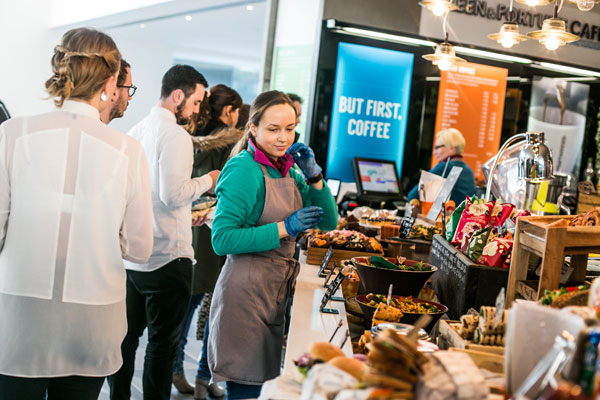Al desko dining: Focus on wellbeing and flexible eating for clients in business and industry
Flexible eating and a focus on wellbeing and fitness has increasingly become a consideration for foodservice operators catering for clients in business and industry. Janie Manzoori-Stamford reports
Foodservice is an increasingly complex beast. Demand for the classic breakfast and hot lunch offer continues to wane as diners become more discerning about what they eat and clients further consider the food and beverage offer as integral to their own operation.
In turn, contract caterers have become much more sophisticated. The growing prevalence of contract deals that force foodservice operators to live and die by what goes into the till, coupled with vibrant and exciting competition on the high street, has unleashed a wave of innovation in the sector.
Today's savvy operators are seizing every opportunity to stand out from the crowd as a result, from embracing the health and wellbeing agenda of
clients and customers alike to supporting productivity and employee engagement through a carefully considered food and drink offer.
In this competitive marketplace, it is no longer enough to simply sate hunger.
Productivity boost
This trend is being driven by a change in attitude to food and work, from agile and part-time working and increasing awareness of diet and fitness as performance factors.
Everything any forward-thinking client company is looking for.
"It was specifically developed for knowledge-based workers who represent 60% of the overall labour force and are the single fastest-growing segment. They have unique needs and expectations in relation to their work and working environment and it is our challenge to help our clients drive productivity, retention and engagement of this group," Evans explains.
Also at the brand's core is the workplace consumer's desire for an all-day dining offer.
A 2017 YouGov poll for Sodexo found that 82% of workers would like to see their workplace offer a range of food throughout the day, yet despite 75% of UK workers knowing how important what they eat at work is for their productivity,
65% said they have skipped meals because they've had no time to eat.
"By making food important again, workplace restaurants and dining spaces
can become active social hubs that improve productivity and communication," says Evans. "And opening restaurants for longer hours, extending food offers, and considering the needs and patterns of employees will not only improve wellbeing but also have a positive commercial impact for organisations."
As important as the availability of a catering offer is, of course, the food itself. Hence, caterers are planning menus based on ingredients with proven benefits to productivity, such as Genuine Dining Co's (GDC) new Green & Grains concept. Focusing on low-GI wholegrains that release glucose slowly and assist in improving concentration and focus, the offer has gone down especially well at a client site where the demographic is 75% female.
"It was quite challenging when we first took over the contract because the demand was for dishes that are high-protein, low-fat and often vegan," says GDC group executive chef Jon Day. "But it's not just about providing the right things for their diets; it's about keeping them interested. They're quite a knowledgeable
bunch and they like to be on trend, so we've thought outside the box to bring in different products. Ingredients like seitan, a vegan protein substitute, have gone down well."
Another caterer that carefully considers its demographic is London-based Vacherin, as director of food Dan Kelly explains: "Our media clients tend to have a high number of interns. Typically, millennials prefer a later breakfast followed by all-day grazing, so we err away from a traditional plated meal in favour of a range of mix-and-match snacks. But price is key. We need to ensure we don't alienate these customers by putting pressure on their purse."
The health agenda
It's clear that the health and wellbeing agenda is continuing to progress beyond what some might have considered a fleeting fad into a full-blown movement and foodservice firms are afforded a fresh opportunity to demonstrate their innovation mettle as a result.
So it is no surprise that caterers like Green & Fortune, which operates at London sites Kings Place and Sea Containers, are putting health and wellbeing into sharp focus. "As part of our Green & Lean initiative across both our sites, we offer a number of 'healthier' options but also cater to dietary and wellbeing requirements," explains chief executive John Nugent. "Rather than just lower calories, dishes are usually built around high-protein, low-fat ingredients as a base. Other efforts include replacing refined sugars with naturally occurring sugars or including ingredients high in Omega 3."
Additionally the company serves up seasonal specials such as turmeric lattes, which supposedly lesson the effects of hay fever, as well as energy balls made by in-house bakers to satisfy cravings for something sweet which release energy more slowly than the likes of chocolate Meanwhile, the healthy lifestyles of Vacherin's customers have led to the creation of menus designed specifically for pre- and post-workouts.
"But we have gone one step further," says owner and managing director Phil Roker. "We have tailored these menus according to whether the gym is on- or off-site. If it's on-site, we liaise with the gym provider to determine the fitness activities and what might be required and then jointly promote the food offer. If the gym is off-site, we make the offer portable so it can be grabbed en route, either to the gym or back to the desk."
And for customers looking to learn more about the impact of food on their health, Vacherin nutritionist Gary Baverstock holds workshops in dining rooms across the business with the content designed to meet individual client interest, from calorie counting to 'super foods' and high protein.
He also produces two monthly communications for customers. One, Health Matters, focuses on a particular current health topic that is relevant to the workplace, such as stress, heart health and blood sugar balancing; the other, Food in Focus, aims to demystify the science behind foods, from sugars, fats and carbohydrates to coconut, sodium and chocolate.
Commercial benefits
Creating bespoke concepts based around specific client needs and the health agenda comes with commercial advantages in terms of both winning contracts and attracting customers. Otherwise, why do it? But it's not just the caterer that can reap the rewards.
"Everyone benefits from this focus," says Nugent. "We have seen higher usage of our outlets and more customers purchasing healthier, lighter options, meaning a growth in revenues.
"Most of the customers are consuming a healthier, more balanced diet, which in turn means they are more energised and productive while at work. This also affects our staff, as they are more engaged in having their finger on the pulse of the latest health food trends and looking at how they can bring this into the offering."
And so the dividends of a carefully considered approach to catering are there for the taking, as Sodexo's Evans explains: "Our research last year [in partnership with Quora Consulting] showed that only 36% of workers thought that their organisation cared about their wellbeing and a similar figure (37%) felt well catered for by their organisation. The clear benefits of a new approach to workplace dining will be the increased sales and engagement levels of both our customers and our teams."
And as GDC managing director and 2018 Foodservice Caterer of the Year Catey winner Chris Mitchell points out, what's good for the caterer is good for the client.
"The benefits to us include increased profits, reduced wastage and increased client trust in what we are doing," says Mitchell. "And a rise in sales means a reduction in subsidy for our clients. Customers receive high street-quality products as well as niche food market trends, which means there is less need to leave the building to get what they want. This is in turn increases their productivity in the workplace. Happy people are hardworking people."
Vital statistics
£405m Annual turnover of in-house B&I catering
£2b Annual turnover of outsourced B&I catering
51% of UK foodservice market accounted for by B&I
90% of foodservice leaders say healthy eating is a primary
driver shaping business decisions
Source: 2017 UKHospitality Food Service Management Market Report
Bennett Hay at Landsec
When commercial property development and investment company LandSec relocated its headquarters to Cardinal Place in London's Victoria in January
2017, Bennett Hay was tasked with creating a bespoke food and beverage offer to meet a diverse set of needs within the business.
a number of all-day grazing offers in LandSec's collaborative spaces.
"LandSec decided to do that instead of putting a staff restaurant in," says co-founder Anthony Bennett. "Our team manages four areas within an open-plan
office space and we change the offer throughout the day."
Morning will see staff helping themselves to cereal bars, yogurts, fresh fruit and juices for breakfast, followed by healthy snack items like nuts and dried fruits mid-morning.
The offer changes again in the afternoon to provide energy bars and smoothies as well as the odd bite-sized indulgence.
"It's indicative of how we're seeing offers change. It's almost like you've got to make the F&B offer more useful to a particular section of the building," says
Bennett. "LandSec has designed the workplace to create spaces that bring people together for a reason, so we do different snacks in different areas to encourage staff to use them rather than the same ones every day.
"It's about 60% of what it costs to have a full restaurant and it works for their space and the way in which each department works."
Such has been the success of this catering concept that not only has Bennett Hay helped LandSec's workspace to achieve WELL Certified Silver standard - a global benchmark for a healthy, sustainable office space - it has also been asked by two other tenants in the building to do the same thing for them.
Bennett adds: "It seems to be an interesting model for companies, particularly those that don't want to give up the space for a full restaurant and café."
Continue reading
You need to be a premium member to view this. Subscribe from just 99p per week.
Already subscribed? Log In









